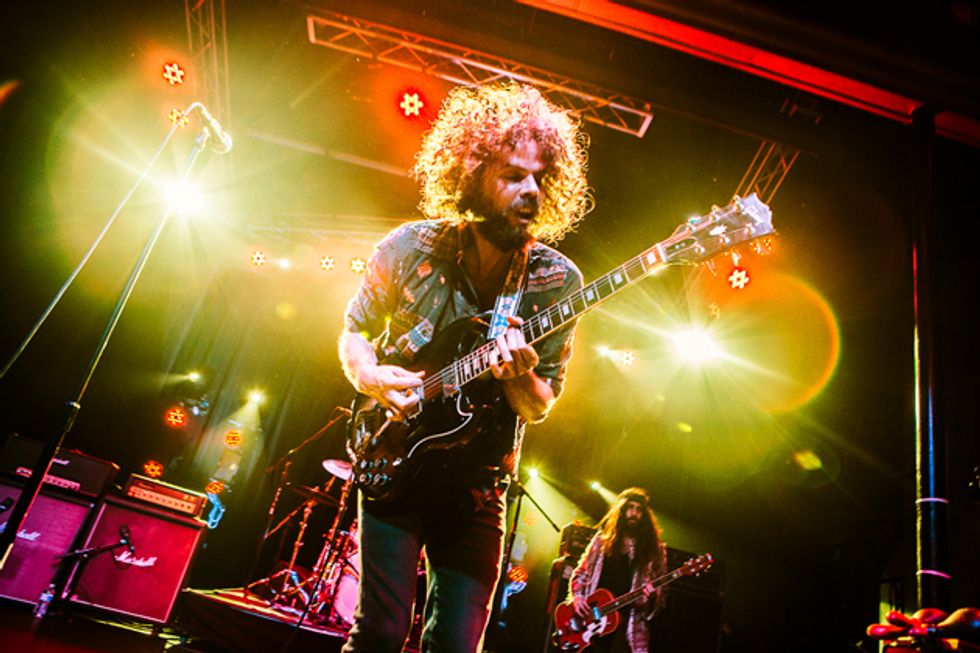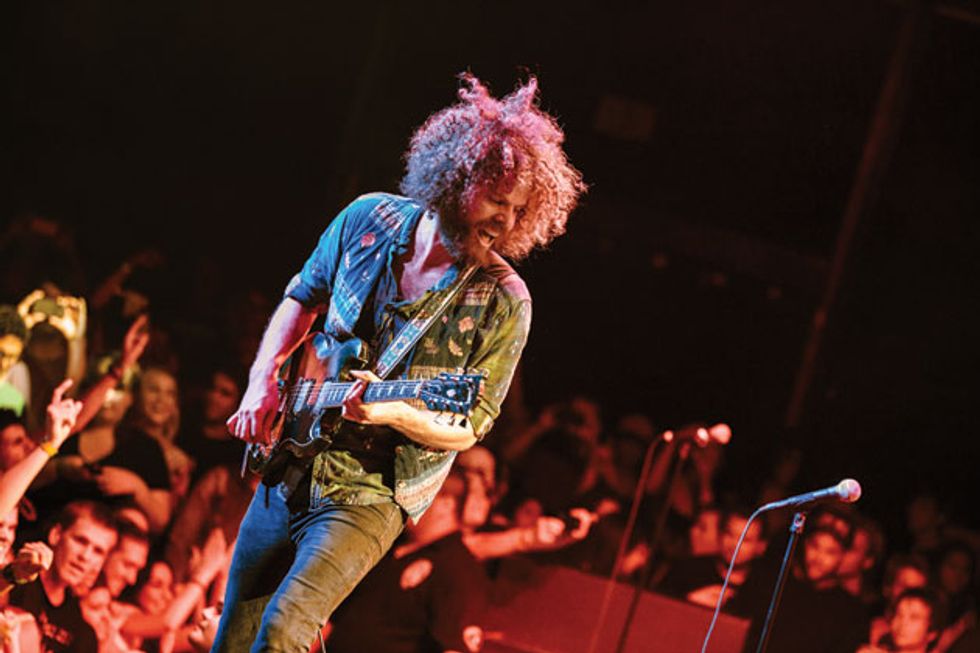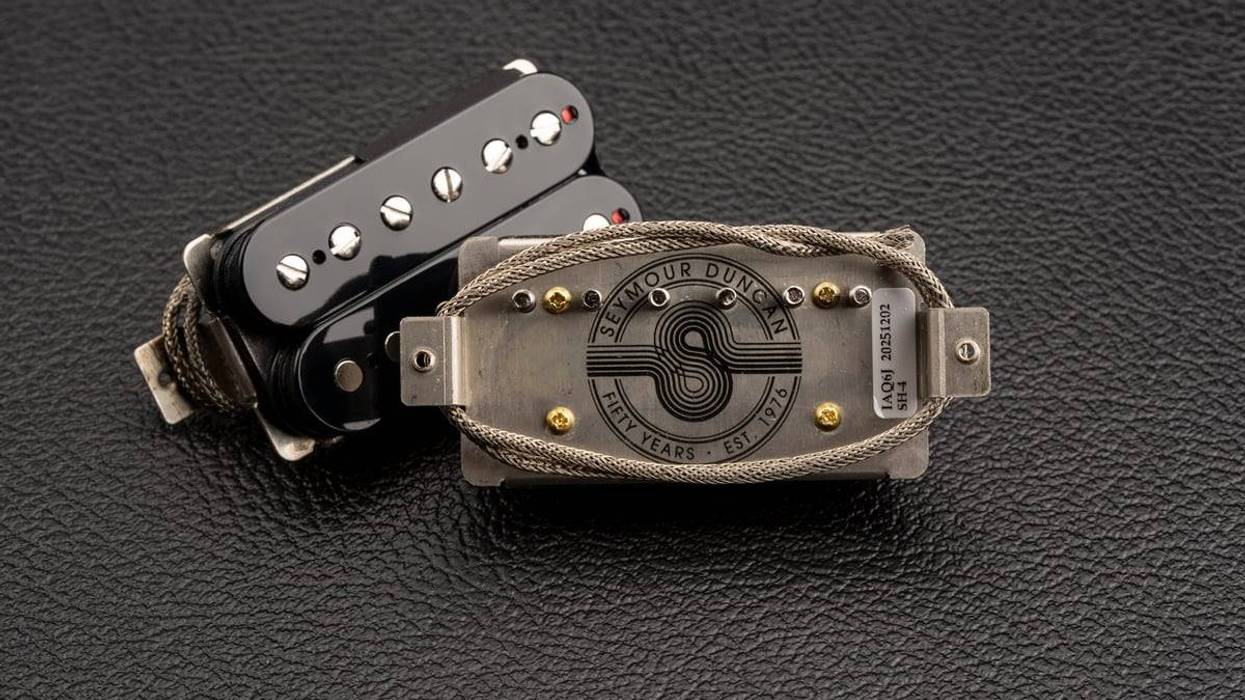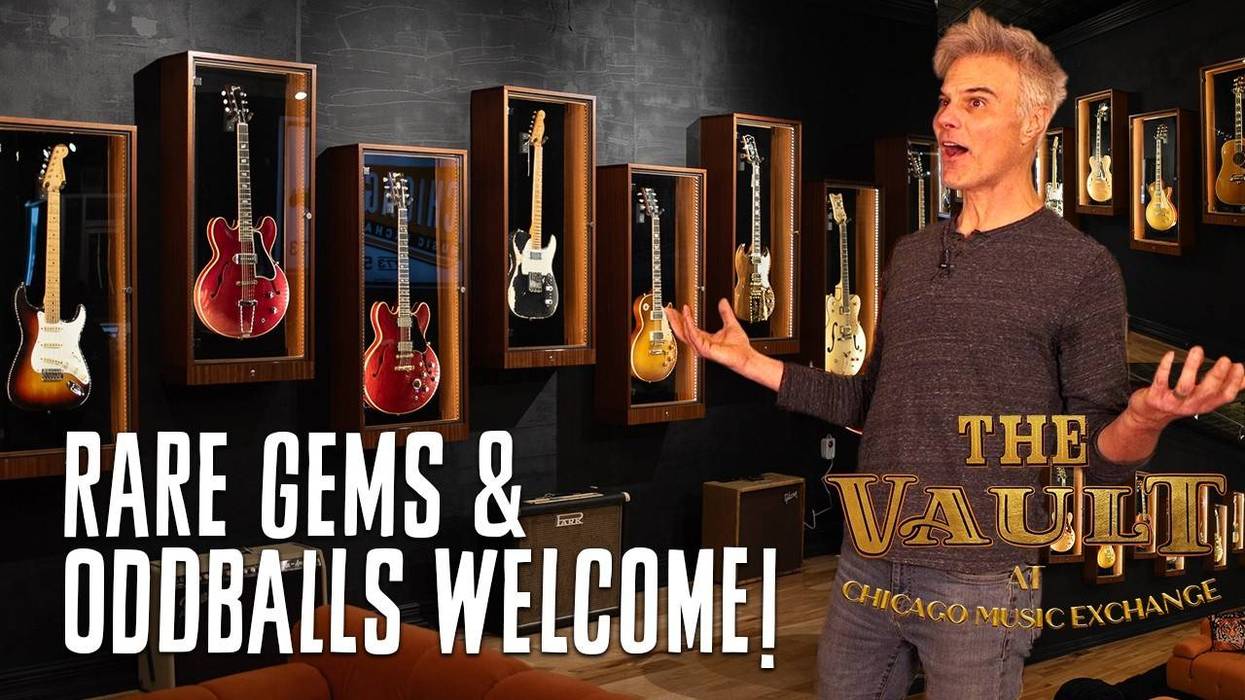One might need a flow chart (or perhaps an abacus) to keep score of the various incarnations of the Australian stoner-psychedelic rock band Wolfmother. In its still relatively brief existence, since forming in 2004, the group has seen only guitarist and frontman Andrew Stockdale remain a constant presence, with bassist/keyboardist Chris Ross, rhythm guitarist Aidan Nemeth, and drummers Dave Atkins, Will Rockwell-Scott, Elliott Hammond, and Hamish Rosser passing through its revolving doors.
After releasing two blistering, fuzz-riff fueled albums—2005’s eponymously titled debut and 2009’s Cosmic Egg—under the Wolfmother moniker, Stockdale briefly ditched the band concept altogether, issuing 2013’s Keep Moving as a solo album, despite the studio contributions of current group members Ian Peres (bass, keyboards) and Vin Steele (drums).
Stockdale admits that Wolfmother might appear to be an unstable entity to those on the outside, but he insists the lineup changes aren’t as dramatic or interesting as they seem. “The new lineup has been together for quite a few years,” he says. “Ian’s been with me six or so years. Vin has been in the band a while. Other lineups were a good amount of time. And, yeah, I did the solo album a few years ago. I wish it were an exciting story. I wish I had some juice to give you. There’s really nothing to it. It’s just scheduling and whatever else: geography, right time, right place, availability, or whatever.”
Reclaiming the Wolfmother name, Stockdale corralled Peres and Steele back into the studio for 2014’s big and bouncy New Crown. But on the band’s new album, Victorious, he went the almost-one-man-band approach, performing all guitar and bass duties with Josh Freese (Devo, A Perfect Circle, Nine Inch Nails) and Joey Waronker (Beck, R.E.M., Elliott Smith) splitting drum responsibilities.
Immaculately produced by Brendan O’Brien (Pearl Jam, Soundgarden, Bruce Springsteen), the new set sounds nothing like a solo project. On the gnashing, walloping title cut or the wickedly turgid “Gypsy Caravan” or even the shiny, handclap-peppered rocker “Best of a Bad Situation,” Stockdale’s exuberantly thrashy, minimalist, and profoundly hooky guitar work achieves a right-in-the-pocket rhythm/lead balance. If you didn’t know any better, you’d swear you were hearing two deeply intuitive axemen going at each other, giving as good as they get.
“If I had any kind of mission statement with this album, it was simply to play everything myself,” says Stockdale. “I just wanted to do it all and kind of cross it over to the Wolfmother sound. That’s what’s important. That’s what I wanted to honor—the Wolfmother sound.”
We spoke with Stockdale about his methodology for writing riffs, why he left his guitars at home and used Brendan O’Brien’s axes on the new album, and how band democracy isn’t all it’s cracked up to be.
For most of its history, Wolfmother has been a trio, but the band was briefly a four-piece. Did you not enjoy playing with a second guitarist? Stockdale: Not really. I had another guitarist on the second record, and I don’t know… I think it was kind of a pointless exercise. The bottom line is, this is a three-piece band. That’s the design of the sound. Wolfmother is based around that setup. I like to hear one guitarist’s style come through. That’s what I’ve always been about.
I started off being the only guitarist, but after a while I thought I’d get someone else in, just to kind of change things a bit, mainly for a personal dynamic. I thought if we had four people it might be more fun. But then it became more of... I’m trying to think of a nice way of putting it. Put it this way: It wasn’t essential.
So you tried it, and you didn’t like it.
What we need is just guitar, bass, and drums. That’s when this band sounds most exciting and most dynamic. If you have too many people in the band, you can’t jam; everybody’s in the way. If you have a three piece, however, then you can jam. When I got another guitarist in there and I’d start making up stuff on the spot, I realized that I had to stop the jam and show every other dude what I was doing. The joy of playing was kind of lost. It was more like a big, organized machine, and I had to demonstrate everything every step of the way.
It all got a bit laborious and exhausting. I’m talking about two or three years of effort, with me trying to persevere being that kind of bandleader. I didn’t enjoy it. Now, I want to have a great time with the band and the music. I want to have an out-of-body experience. I want to bond, musically speaking. It’s better having a threesome because I don’t have to explain myself. It’s much more spontaneous.
On this record you worked with drummers Josh Freese and Joey Waronker. How did that come about?
Stockdale: Well, I asked Alex Carapetis if he could do it, but he was on tour with Julian Casablancas and the Strokes. It was more based around the availability of the producer, and when we could schedule everything. See, again, this isn’t really a band. Creatively speaking, I wrote everything on Cosmic Egg, the majority of the stuff on Keep Moving and New Crown. I’m the primary creative force. I’m the writer who gets everything going. I pull together whatever lineup is suitable to do a tour.
Take a bit of advice from me: It works. You want to stand in a room with a bunch of dudes and try and write together all the time? Do everything together? You can do that at the start, but it has an expiration date, I think. At some point, someone is going to step forward and really start contributing more than the rest. Then you’ve just got to think, “Are these people really adding to the sound?” Maybe not. Maybe they’re just having a couple beers and going on tour and getting paid and seeing the world. That’s fine. You don’t have to sell this age-old idea of the band that does everything together and chips in and everything. They all do this, they live together…
I get it. You like calling the shots.
I’m a 39-year-old man. I have a wife and daughter. I wake up and I write a song—it takes me five hours. Maybe not even that, maybe three hours. I wrote this record in two-and-a-half weeks.
What was it about Brendan O’Brien that appealed to you?
He was recommended by management. He was working on Chris Cornell’s record, and my manager was like, “You’ve got to meet this dude, Brendan O’Brien. He’s great. He’s just what you need.” They wanted someone who could get their teeth into a Wolfmother record.
What did Brendan bring to the recording process, as far as your guitar playing goes?
It was all very quick, the recording process. We would go into the studio and be like, “Let’s do ‘Gypsy Caravan,’” and we’d just start playing it. I’d play electric, he’d play electric, and we’d just play it from start to finish. Then he might say, “How about we stretch that chorus out a bit?” I thought, “Yeah, that’s a good idea.” He was good at talking through arrangements very quickly as another guitarist. I respected his opinion, because he’s got a track record for making good records.
Did you use any of his guitars or gear?
Only his guitars. I didn’t take anything with me to make this record. This is the first time I went in and didn’t take a band or guitar or anything. I emailed my demos, like, three months in advance, I went in, and, a month later or something, it was done. I played guitar and bass. Ian came in for two or three days and played keys. Joey Waronker did half the record and Josh Freese did the other half.
Whether releasing albums under the Wolfmother name or his own, it’s clear that everything Andrew Stockdale writes, records, and plays is the result of his own vision. Photo by Debi Del Grande
What guitars of Brendan’s did you use?
He had a cool SG with a whammy, more like a Bigsby. I thought it was damn good, so I used it. And I played a Rickenbacker, too. Those were the only guitars I used on the record. He’s got a lot of vintage gear, stuff from the ’50s and ’60s. Lots of analog gear.
What kind of amps did you use?
I’m pretty sure I used a Marshall 50 watt.
You’ve been known to play a Gibson EDS-1275 doubleneck onstage. Have you ever found a reason to record with that guitar?
[Laughs.] No, no. I don’t know what you’d use that for in the studio, unless you wanted to switch right away to the 12-string, which could be handy. Gibson gave me that guitar. I didn’t even know they were going to give it to me. I just turned up to a gig, I think it was in Nottingham in the U.K., and there were 16 guitars at soundcheck. That was one of them. But you know, maybe I should write something for that, to use it in the studio. That’s it—I’m going to do it before the end of the week.
In the press release for Victorious you said you played a “weird-looking ’90s metal guitar.” What was that?
Ah, that was on my demo. That’s an Ibanez. I forgot what it was called. But I didn’t use that on the record. I just used Brendan’s stuff. He had a Big Muff distortion—I used that.
When you write, do you practice riffs and sing at the same time to make sure you can do both easily? Knowing that you’ll have to do both onstage…
No, I just play the guitar. I walk in and just press “record” and start playing. Then I listen back to it, lay down some drums, then do bass, and then I sing over it after that. Sometimes I might be at home playing something and I start singing at the same time. Sure, I try it both ways. There’s no set way of doing things.
What do you do to get live-energy performances in the studio?
I like to have everything set up as soon as I walk in, and then I just pick up the guitar and start playing straight away. Sitting around waiting can kill your mood. I find the first thing I do is usually the most exciting. You want to be excited to be in there, and then you just go for it and something happens. Something magical happens.
Your solos are nice little bursts of melody. Who are your influences as a soloist?
Jimmy Page, Keith Richards, George Harrison. I like Robby Krieger from the Doors. I like guitarists who don't necessarily just shred. I’m into people who try to bring some kind of melodic structure to the solo, so it’s almost like a hook.
Do you ever feel like you want to go “outside” it a little bit? Take the solo somewhere else harmonically or structurally from the song?
Yeah. I think there’s one song I do that on: “Remove Your Mask” [from the Zoolander 2 soundtrack]. On the outro, that’s definitely a different chord progression where I was really trying to emulate, in some ways, the guy from Mountain, Leslie West. I really like his stuff—how he does a little move and then he leaves it and comes back later. I really like that style.
Andrew Stockdale’s Gear
Guitars (live)Gibson SG brown faded w/Bigsby (circa ’72–’73)
Early '60s Gibson SG with P-90s
Gibson SG Supra custom white
2013 Gretsch White Falcon
Amps (live)
Vox AC30 HW2C w/Celestion Alnico Blue speakers
Fender Bassman ’59 reissue
Fender Bandmaster
Marshall 1960AX 100-watt 4x12 cabinet w/Celestion G12M-25 Greenbacks
Marshall JMP 50-watt head (in the U.S)
Klemt Echolette BS40 (1960s)
Effects
Xotic AC Booster
Electro-Harmonix Micro POG
Dunlop Cry Baby Wah Wah
Foxx Tone Machine octave
Roland AF-100 Bee Baa fuzz/treble/reverb
Fulltone Supa-Trem ST-1
MXR Phase 90
Radial BigShot A/BY True Bypass Switcher
Electro-Harmonix Big Muff (studio)
Strings and Picks
D’Addario EXL125s (.009–.046)
Dunlop Tortex .73 mm signature
Do you play around with different pedals and go into the unknown just to see what will happen?
The last gig I did I just took a Vox AC30 with me. I didn’t even take a pedal, and I really enjoyed it. I love playing all the Wolfmother songs without any pedals. I turn the amp up to 10 so I have this natural distortion, and then I play with the volume knobs on the guitar turned up, and then I just switch between the two pickups. It’s simple. When you do that, your playing really improves. You can rely on the pedals to the point where you get boxed in a corner. Take yourself out of that and it makes things exciting.
On the album, how many guitars would you usually layer for rhythm tracks?
Probably two. That’s as far as we went. We didn’t get too crazy.
Halfway through the title track, it switches to a riff and a rhythm that’s not unlike Black Sabbath's “Paranoid.” Intentional? Really? You think? No, it’s different. That’s way different timing from “Paranoid.” [Picks up a guitar and starts playing the riff.] It’s a bit more upbeat. [Plays the main “Paranoid” riff.] Okay, okay, maybe once the verse starts on “Paranoid,” I can see that. But how many songs could you say have similar chords like that? It’s consistent with an E blues song.
I listened to the demo of “The Love That You Give,” which is on YouTube. It’s very similar to the studio version.
Yeah, that’s right.
The riff is very simple but dramatic. How many iterations do you go through before ending up with the perfect riff like that?
That one was straight off the bat, as soon as I walked into the studio. I think it was, like, New Year’s Day or the day after Christmas. I went into the studio, and there it was. That was interesting. That’s one of those days where you just get lucky.
Do you have a methodology for coming up with riffs? My main thing is just to dig deep from my gut. Play it from my soul. Get out of my head and play it like I mean it.
“Pretty Peggy” is an acoustic-based song. What guitar did you use on that one? Oh, that was a 1960s Gibson. I can’t remember what it’s called, but it looks like a Martin.
Do you have a different approach to playing acoustic than you do electric?
I guess acoustic is more rhythmically driven—for me, anyway. When you play acoustic, the rhythm is more pronounced. Also when you’re on an acoustic, fingerpicking goes a long way in making it a little more interesting for the listener.
YouTube It
Riffs galore power Andrew Stockdale’s performance of “Joker & the Thief” with Wolfmother on Chicago’s live-in-the-studio JBTV. Just past the 3-minute mark, he stomps on an overdrive box and plays a stagger-stepped solo that also draws upon his faded brown Gibson SG’s whammy bar and some ’60s psychedelic-era tone.
Do you ever fingerpick on an electric?
Sometimes. On “Vagabond” [from 2005’s Wolfmother] there’s some fingerpicking. Whatever the song needs.
You get a great fuzz tone all over the record, but it’s particularly massive on “Gypsy Caravan.” What’s the secret for that sound?
It’s all in the way I play it. A lot of my riffs are power chords. For that one, I thought I would just do it in a single-string style. Then I guess maybe the last note kind of captures the tail end of the beat. It’s like goosing it a little bit. When you do stuff like that, it seems to give it more of a groove. I think people love a good groove.
That’s my thinking to a lot of this stuff. Get in there and make it matter, make it groove. I see people try to riff, and it’s far too exact. It’s like a big ritual. That doesn’t really make people feel anything unless you’re very good at that and you’re a very technical metal guy.


















![Rig Rundown: Russian Circles’ Mike Sullivan [2025]](https://www.premierguitar.com/media-library/youtube.jpg?id=62303631&width=1245&height=700&quality=70&coordinates=0%2C0%2C0%2C0)
















![Rig Rundown: AFI [2025]](https://www.premierguitar.com/media-library/youtube.jpg?id=62064741&width=1245&height=700&quality=70&coordinates=0%2C0%2C0%2C0)











